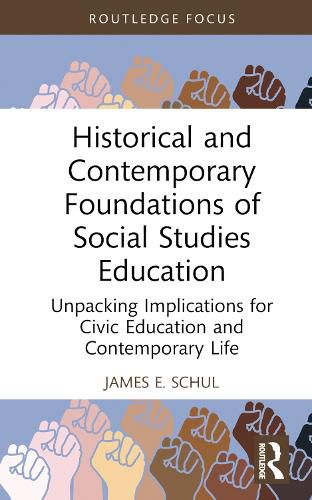Readings Newsletter
Become a Readings Member to make your shopping experience even easier.
Sign in or sign up for free!
You’re not far away from qualifying for FREE standard shipping within Australia
You’ve qualified for FREE standard shipping within Australia
The cart is loading…






This book explores the rich history and depth of the educational field of social studies in the United States and examines its capacity to moderate modern-day anti-democratic forces through a commitment to civic education.
Drawing out key significant historical moments within the development of social studies education, it provides a compelling historical narrative of the ideas that shaped the unique curricular field of social studies education. This book resynthesizes each historical stage to show how it resonates with contemporary life and effectively helps readers bridge the gap between theory and practice. Focusing on the key ideas of the field and the primary individuals who championed those ideas, the author provides a clear, concise, and sharply pointed encounter with social studies education that illuminates the connection from research to practice.
Researchers of social studies education will find this book to be a worthy contribution to the ever-important struggle to better understand the type of civic education necessary for the perpetuation of democratic life in the United States. It will also appeal to educational researchers and teacher educators with interests in the history of education, teacher education, civic education, moral education, and democracy.
$9.00 standard shipping within Australia
FREE standard shipping within Australia for orders over $100.00
Express & International shipping calculated at checkout
This book explores the rich history and depth of the educational field of social studies in the United States and examines its capacity to moderate modern-day anti-democratic forces through a commitment to civic education.
Drawing out key significant historical moments within the development of social studies education, it provides a compelling historical narrative of the ideas that shaped the unique curricular field of social studies education. This book resynthesizes each historical stage to show how it resonates with contemporary life and effectively helps readers bridge the gap between theory and practice. Focusing on the key ideas of the field and the primary individuals who championed those ideas, the author provides a clear, concise, and sharply pointed encounter with social studies education that illuminates the connection from research to practice.
Researchers of social studies education will find this book to be a worthy contribution to the ever-important struggle to better understand the type of civic education necessary for the perpetuation of democratic life in the United States. It will also appeal to educational researchers and teacher educators with interests in the history of education, teacher education, civic education, moral education, and democracy.